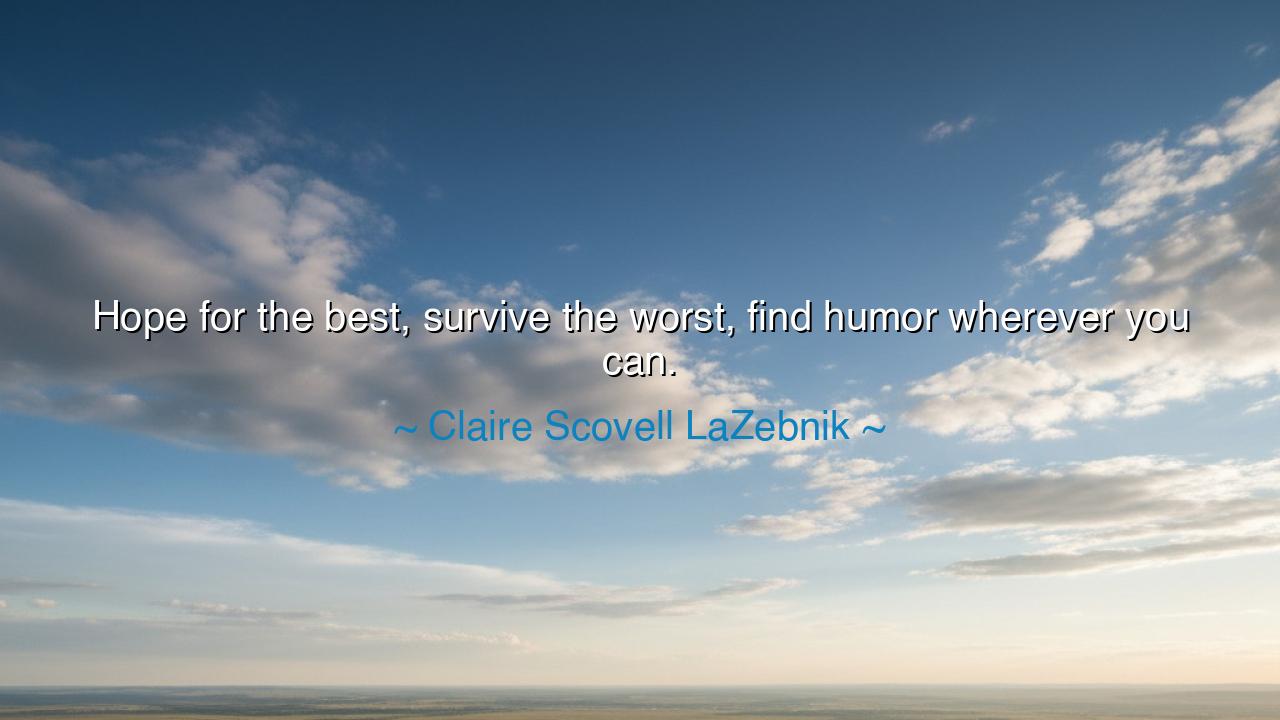
Hope for the best, survive the worst, find humor wherever you






When Claire Scovell LaZebnik said, “Hope for the best, survive the worst, find humor wherever you can,” she distilled the essence of resilience into a simple yet profound triad. In these words lies the wisdom of the ages: the acknowledgment that life is a path strewn with uncertainty, sorrow, and unforeseen trials, yet also a journey of joy, wonder, and laughter. Hope, she teaches, is not naive optimism; it is the seed of courage. Survival is not mere endurance; it is the conscious choice to persist despite despair. And humor, ever elusive and light, is the balm that preserves the soul amid hardship.
The ancients would have recognized this triad as a roadmap for the human spirit. Hope for the best mirrors the Stoic call to envision virtue even in chaos, to trust in one’s ability to navigate fate. Survive the worst echoes the words of Epictetus, who reminded his disciples that life will present obstacles beyond measure, yet the mind and heart remain free to endure. And to find humor wherever you can is the wisdom of sages, jesters, and poets alike — the realization that even in tragedy, laughter can emerge as a spark of the divine, a reminder that we are more than our suffering.
Consider the story of Anne Frank, who, even in the darkness of hiding, wrote of moments of laughter with her companions, of teasing, and of small absurdities that broke the tension of imprisonment. She exemplified LaZebnik’s wisdom: she hoped for the best in a world filled with danger, she survived the worst through courage and ingenuity, and she found humor wherever she could, even in letters and anecdotes shared within the walls of the annex. Her laughter was quiet but potent — a weapon of resilience and dignity, a testament to the human spirit.
Hope, in this triad, is the lantern carried through the long night. It is the vision of possibility that gives strength to the weary, the whisper of light amid shadows. LaZebnik reminds us that to hope for the best is to actively choose optimism, not as a denial of hardship, but as a commitment to the potential of joy, achievement, and connection. The ancients taught that hope is not passive; it is a discipline, a skill cultivated through mindfulness, reflection, and courage.
Yet life does not always reward hope with comfort. The call to survive the worst is the recognition that suffering is inevitable. Those who have walked the paths of war, exile, or illness know this truth intimately. Winston Churchill, during the darkest days of World War II, exemplified this principle. Despite facing the threat of national collapse, he endured personal and collective hardship with relentless determination. He did not surrender to fear, despair, or defeat. To survive the worst is to meet life’s storms head-on, with resolve tempered by wisdom.
And then comes the final, often overlooked ingredient: humor. In the midst of battle, illness, or heartbreak, it is humor that sustains. It is the laughter that softens the weight of sorrow, the smile that preserves the heart’s agility in a world of rigidity. Humor, as LaZebnik suggests, is a way of transcending circumstance, a small rebellion against fate, a recognition of life’s absurdities. It is, in essence, the human spirit asserting, “I may suffer, yet I remain alive — fully, deeply, irrepressibly alive.”
The lesson, then, is timeless and vital: cultivate hope as your lantern, endurance as your shield, and humor as your balm. When confronted with uncertainty, choose to hope. When confronted with hardship, choose to survive. And when confronted with life’s absurdities, choose to laugh. These three actions are not trivial; they are acts of courage, artistry, and wisdom. They remind us that the human spirit can rise above circumstance, that life can be endured and even celebrated, and that joy can coexist with sorrow, if only we dare to see it.
In practical terms, this triad guides daily living. Begin each day with hope — set intentions, envision possibility, embrace optimism. Face trials with persistence and self-compassion, remembering that endurance is an art. And finally, seek humor in the ordinary, in mistakes, in the quirks of existence, for it is in laughter that the soul finds freedom. Claire Scovell LaZebnik’s words are a call to live fully, with courage in adversity, joy in survival, and laughter as a constant companion.






AAdministratorAdministrator
Welcome, honored guests. Please leave a comment, we will respond soon